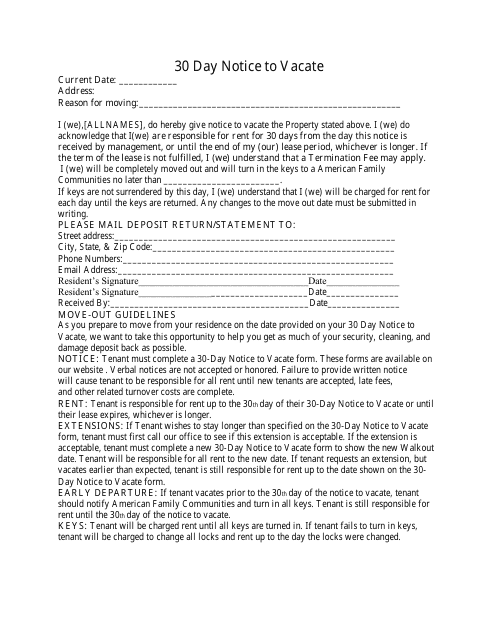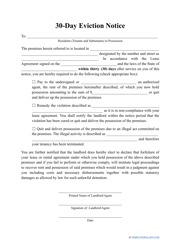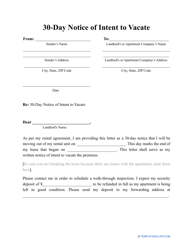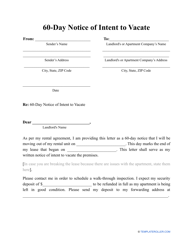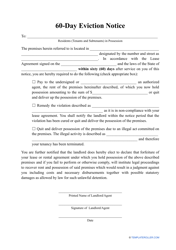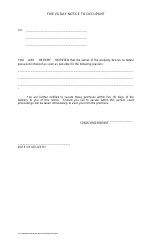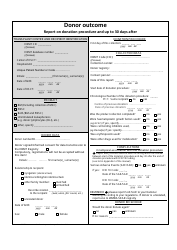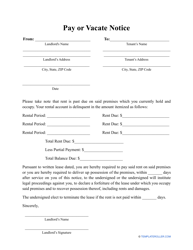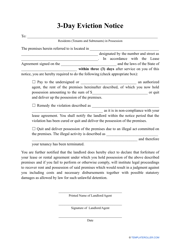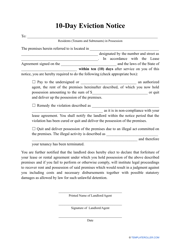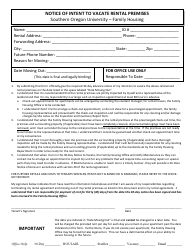Sample 30 Day Notice to Vacate Template
A Sample 30 Day Notice to Vacate Template is a form letter typically used by tenants to inform their landlord or property manager that they intend to move out of a rental property. This template helps tenants provide proper notice in accordance with their lease agreement, allowing them to end their tenancy and avoid any potential penalties or conflicts. It outlines the tenant's intention to vacate the premises within 30 days and may include other relevant information such as the reason for moving and instructions for returning the keys or requesting a move-out inspection. This template serves as a useful tool for tenants to exercise their rights and communicate their plans to the landlord in a clear and formal manner.
The sample 30-day notice to vacate template is typically filed by the tenant, who wishes to inform their landlord or property manager about their intention to move out of the rental unit.
FAQ
Q: What is a 30-day notice to vacate?
A: A 30-day notice to vacate is a written notice given by a tenant to their landlord, indicating their intention to move out of the rental property within 30 days.
Q: When should I use a 30-day notice to vacate?
A: You should use a 30-day notice to vacate when you want to end your tenancy and move out of your rental property. This notice is typically required if you are on a month-to-month lease or if your lease agreement specifies a 30-day notice period.
Q: Why is it important to provide a notice to vacate?
A: Providing a notice to vacate is important because it allows both the tenant and landlord to prepare for the end of the tenancy. It gives the landlord time to find a new tenant and the tenant time to find a new place to live.
Q: What should be included in a 30-day notice to vacate?
A: A 30-day notice to vacate should include the tenant's name, the address of the rental property, the date of the notice, and a clear statement indicating their intention to move out within 30 days. It is also a good idea to include any additional details or requests, such as a forwarding address for security deposit refund.
Q: How should I deliver the notice to vacate?
A: To ensure proper delivery and documentation, it is recommended to deliver the notice to vacate in writing, either by hand-delivering it to the landlord or sending it via certified mail with a return receipt requested. This way, you have proof that the notice was delivered and received by the landlord.
Q: Is a 30-day notice to vacate always required?
A: A 30-day notice to vacate is not always required. The specific notice period may vary depending on the terms of your lease agreement or state laws. It is important to review your lease agreement or consult local laws to determine the appropriate notice period.
Q: Can I give less than 30 days' notice to vacate?
A: In some cases, you may be able to give less than 30 days' notice to vacate, but it is best to consult your lease agreement or local laws to understand the requirements. Giving less notice may result in penalties or financial obligations.
Q: What happens if I don't provide a notice to vacate?
A: If you fail to provide a notice to vacate as required, you may be held responsible for additional rent payments or other penalties specified in your lease agreement. It is important to follow the proper procedures to avoid any legal or financial consequences.
Q: Can I change my mind after giving a notice to vacate?
A: If you change your mind after giving a notice to vacate, it is best to discuss the situation with your landlord as soon as possible. Depending on the circumstances, they may be willing to work with you and make alternative arrangements.
Q: Do I need to clean the rental property before moving out?
A: In most cases, it is expected that you clean the rental property before moving out. Your lease agreement may specify cleaning requirements, such as the need to hire professional cleaners or return the property in a certain condition.
Q: When can I expect to receive my security deposit refund?
A: The timeframe for receiving your security deposit refund may vary, but it is typically within a few weeks after move-out. The landlord will deduct any necessary expenses for repairs or unpaid rent before returning the remaining amount to you.
Q: What should I do if I haven't received my security deposit refund?
A: If you haven't received your security deposit refund within the expected timeframe, you should reach out to your landlord to inquire about the status. If communication becomes an issue, you may consider seeking legal advice or assistance from your local housing authority.
Q: Can a landlord evict a tenant without a 30-day notice?
A: In most cases, a landlord cannot evict a tenant without providing the required notice as specified in the lease agreement or local laws. Without proper notice, the eviction may not hold up in a court of law.
Q: What are the consequences of breaking a lease without proper notice?
A: Breaking a lease without providing proper notice can result in various consequences. It may include financial penalties, loss of security deposit, negative rental history, or even legal action from the landlord.
Q: Can a landlord refuse to return my security deposit?
A: A landlord may refuse to return your security deposit if there are valid deductions for unpaid rent, damages beyond normal wear and tear, or other expenses outlined in the lease agreement. However, they are generally required to provide an itemized list of deductions.
Q: Is a notice to vacate the same as an eviction?
A: No, a notice to vacate is not the same as an eviction. A notice to vacate is typically provided by a tenant to indicate their intention to move out. An eviction, on the other hand, is a legal proceeding initiated by a landlord to remove a tenant from the rental property.
Q: Can I negotiate the terms of the notice to vacate?
A: In some cases, you may be able to negotiate the terms of the notice to vacate with your landlord. It is best to discuss any specific requests or concerns you have with them directly and try to reach a mutually acceptable agreement.
